SATURDAY, 25.08.2001
11.00 a.m.: Mr. Werner Sack / former Juvenile Judge, Frankfurt
12.00 a.m.: Professor Dr. Roland R. Theimer / University of Wuppertal
1.00 - 2.00 p.m.: lunchbreak
2.00 p.m.: M.D. Martin Schnelle / Europ. Institute for Oncological + Immunological Research, Berlin
3.00 p.m.: M.D. Claude Vaney / Senior Consultant MS Hospital Montana, Switzerland
4.00 p.m.: M.D. Franjo Grotenhermen / Association Cannabis as Medicine, Cologne
SUNDAY, 26.08.2001
11.00 p.m.: Robert Wenzel / Lawyer, Hamburg
12.00 a.m.: Dr. pharm. Christian Steup / THC Pharm GmbH, Frankfurt
1.00 - 2.00 p.m.: lunchbreak
2.00 a.m.: Sebastian Glathe / Lawyer, Freiburg
3.00 p.m.: Mr. Mathias Broeckers / HanfHaus GmbH, Berlin
4.00 p.m.: Mr. Franz Niewelt / Drugs Advice Center, Recklinghausen
| Werner Sack, Juvenile Court Judge (retd.) |
 SATURDAY, 25.08.2001
11.00 a.m.:
SATURDAY, 25.08.2001
11.00 a.m.:Natural Cannabis for Patients
Legal and Actual Possibilities: Now and in Future
The delivery of Cannabis preparations for medical purposes in the Federal Republic of Germany is still limited at present to few indications and few preparations. The medical use of Cannabis as a natural product, as hashish or marijuana, is very rarely discussed.
Hemp, however, is well-known as a welfare plant since thousands of years, which was traded with still about 100 years ago in our pharmacies and prescribed by physicians.
During in the last years, the debate to make Cannabis usable again as medicine fortunately got going, but the application of natural hemp for different reasons is not topic. The discussion is marked by by physicians and pharmacists or controlled by their argumentation chains. Apart from the note to the prohibition-conditioned procurement problems, lack of exact dosage possibilities of the not standardizable natural product is one of the main arguments.
I do not consider this discussion as finished yet - there are even developments, which put a new complexion on it. Particularly because of the enormous cost advantage of the natural products opposite to industrial preparations the dispute should be continued.
I would like to make my contribution to it.
Now: Supervisor (DGSV), in education as a diploma supervisor at the Polytechnic University of Kassel
Professional Activities:
Since end of 2000 in retirement (for health reasons)
Honorary Activities:
Numerous publications and public lectures on topics of drug use, especially on Cannabis
| Prof. Dr. Roland R. Theimer |
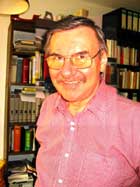 SATURDAY, 25.08.2001 12.00 a.m.:
SATURDAY, 25.08.2001 12.00 a.m.:Hemp - the defamed crop plant - useful and protective for mankind and nature
Hemp (Cannabis sativa L.), one of the oldest crop plants used by mankind, provides both fibers with extreme tensile strength and water resistence along with hurds and edible leaves and seeds as food for humans and animals. These varieties of food and industrial hemp contain only less than 0.3% of the psychotropic drug THC and are - in contrast to drug hemp varieties - permitted for agriculture in the European Union. Hemp seed is a highly valuable food and feed containing ca. 30% best, cholesterol-free nutrient oil of an ideal set of fatty acids such as oleic, linolic, linolenic, and gammalinolenic acid.
In addition, hemp seed provides ca. 25% highly valuable protein with all essential amino acids along with all major minerals and food fibers. The hemp plant matures within 100 days to up to 5 meters height, needs no extra fertilization and essentially no chemical pest control, it loosens the soil remediating it by the binding of heavy metal contaminants. Hemp's resistance to pests of all kinds and its production of natural biocides are intensively investigated at present.
Food hemp therefore is an ideally useful food and protective plant found with numerous varieties highly adapted to essentially all climatic and soil conditions
born 06/27, 1941 at Sternberg/Germany.
| M.D. Martin Schnelle (European Institute for Oncological and Immunological Research, Berlin) |
 SATURDAY, 25.08.2001 2.00 a.m.:
SATURDAY, 25.08.2001 2.00 a.m.:Anorexia/Cachexia in Cancer and AIDS Patients
Anorexia/cachexia are unpleasant devastating and highly prevalent symptoms which undermine quality of life for people with terminal diseases like cancer and AIDS. Although incompletely understood, some common mechanisms are likely to underlie the development of anorexia/ cachexia associated with cancer and AIDS. In contrast to simple starvation, the weight loss in anorexia/cachexia is not only a result of reduced food intake. Complex interactions among the nervous, endocrine, immune and other systems determine derangement in host metabolism involving metabolic rates as well as the processing of virtually all metabolic substrates.
Marijuana smoking or hashish ingestion has long been reported anecdotally to increase hunger and appetite. In some small clinical phase II trials in AIDS and cancer patients (and one phase III trial in AIDS-wasting) the appetite-enhancing effect of delta-9-THC was demonstrated. Delta-9-THC has been approved in the US in 1991 for treatment of the wasting-syndrome in AIDS patients. However, an overall clinical benefit needs to be shown in future, especially in patients suffering from advanced cancer.
| M.D. Claude Vaney / Bernese Hospital Montana, Switzerland |
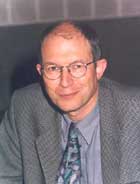 SATURDAY, 25.08.2001 3.00 a.m.:
SATURDAY, 25.08.2001 3.00 a.m.:Cannabis and THC in the Treatment of Spastic Symptoms on Patients with Multiple Sclerosis
Demonized by some, high-praised by others: the hemp plant does not leave anyone indifferent! In the today's time of the vehement controversy about the legalization of Cannabis it is important to report objectively not only on the possible medical use, but also the limits of Cannabis and its main active substance THC (Tetrahydrocannabinol). This is to occur in this overview on the basis of handling spastic symptoms at Multiple Sclerosis, particularly since the often therapy-resistant character of this symptom sufficiently justifies the search for unorthodox measures to their relief.
The lecture will treat the following items:
* 1951, married, 2 children
1972 - 1978 Medical studies in Bern, Switzerland
Since 1990 Senior Consultant; Department of Neurological Rehabilitation, Bernese Hospital Montana
Memberships:
| M.D. Franjo Grotenhermen, International Association for Cannabis as Medicine e.V. ,Cologne |
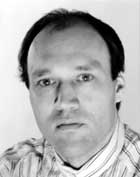 SATURDAY, 25.08.2001 4.00 a.m.:
SATURDAY, 25.08.2001 4.00 a.m.:Cannabis as Medicine: Mode of action, side effects, interactions
This lecture gives an overview on the mode of action of cannabinoids as well as on several practical aspects of interest with regard to the therapeutic use of cannabis products, among them side effects, contraindications, interactions with other drugs and dosing. In the past 15 years a new signalling system of the body has been elucidated, a system consisting of specific proteins on the surface of body cells to which cannabinoids bind, so-called cannabinoid receptors, and of endogenous substances that bind to these receptors, so-called endocannabinoids. The major side effects of a cannabis therapy resulting from overdosage affect psyche and cognition, and heart and circulation. They are predominantly mild and transient. There are possible interactions with several substances. Partly they are welcome, because they act synergistically in a therapeutic sense, partly they are unwanted. Severe unwanted interactions are not known. The responsiveness to a therapy with cannabis and the sensitivity to certain side effects vary, so that slowly increasing doses should be applied to find the appropriate dose, especially with oral administration.
M.D. Franjo Grotenhermen, * 1957, nova-Institute for Ecological Innovation, Chairman of the International Association for Cannabis as Medicine e.V..
nova-Institut GmbH
Goldenbergstrasse 2
D-50354 Huerth
Fon: 0221-139 25 79
Fax: 0221-130 05 91
International code: ++49
E-mail: franjo.grotenhermen@nova-institut.de
| Robert Wenzel / Lawyer, Hamburg |
SUNDAY, 26.08.2001 11.00 a.m.:
The Way to Law - Cannabis as Medicine
The speaker points out that the prohibition of Cannabis as a medicament is unconstitutional. He offers solution options for a legal use and for possibilities for patients to treat themselves with Cannabis. The speaker requests physicians to refer to their right to choose the optimal therapy, to turn against § 13 Abs. 1 S. 3 BtmG (German Narcotic Law) and to support their patients in their need for Cannabis as medicine.
The lecture takes up the following questions:
a. Cultivation
b. Import
c. Purchase
d. Tolerance
a. "Körner-Gutachten"
b. Applications by physicians: freedom to choose a therapy
* 1965, married, 1 child
www.jur-anwalt.de
Tel. +49 (0)40 - 420 66 66
| Dr. Christian Steup / THC Pharm GmbH, Frankfurt |
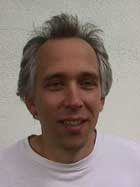 SUNDAY, 26.08.2001 12.00 a.m.:
SUNDAY, 26.08.2001 12.00 a.m.:Lemon against Vitamine C, Cannabis against Dronabinol - An Attempt to objectivize the Debate around Cannabis in the Medical Therapy
Cannabis belongs to the traditional medicaments and is used already for over 3000 years. In the consequence of building a highly profitable chemical and pharmaceutical industry after the Second World War however the use of this not very profit yielding natural raw material turned out into oblivion. While the medical Cannabis research was still quite active around the turn of the century, the interest strongly flagged starting from the 30's due to missing standardized preparations and starting from the 60's due to the stigmatizing of hemp products.
In the 80's, the full synthesis of the active substances of Cannabis and renaming of THC to Dronabinol decoupled the active substance from the plant and enabled so the permission of Marinol by Unimed. After the modification of the German Drug Law in February 1998 it became possible to prescribe the active substance of Cannabis to patients in Germany, too.
The THC Pharm GmbH (founded 1996 by concerned parties) then developed a procedure to produce the the main active substance Dronabinol from fiber hemp, since the use of THC-rich hemp further remains forbidden.
The married father of two sons first finished his medical studies before starting his pharmaceutic studies which he ended as a pharmacist. His scientific curiosity pushed him into the founding of his own laboratory, specialized on the synthesis of complex active and medicinal substances. A friend of his - a biochemist, who unfortunately is paraplegic - experienced positive effects by using Cannabis to ease his occurring spastic symptoms. This led to the idea to synthesize Dronabinol and to put it on the market as a prescription.
Therefore, in 1996 the THC-pharm GmbH was founded together with two independent consultants from the environmental and the financial branch. Aim of the company is the legal research and supply of urgently needed medicines from Cannabis and other renewable resources for a multiplicity of medical indications. Here is particularly to be researched in fields, which apply unattractive to the pharmaceutical companies due to a too small patient number or missing patenting abilities (so called "Orphan drugs").
Since 1996, Christian Steup is managing associate of the THC pharm GmbH.
| Sebastian Glathe / Lawyer, Freiburg |
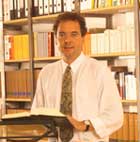 SUNDAY, 26.08.2001 2.00 a.m.:
SUNDAY, 26.08.2001 2.00 a.m.:Current Driving License Regulations
A person who consumes drugs or is anyhow handling with them without consuming and is owner of a driving licence at the same time, increasingly runs the risk in the Federal Republic of Germany - lately since the middle of the nineties - to get the driving licence withdrawn if the responsible driving licence authority attains knowledge of this circumstance.
Even if the driving licence is not withdrawn immediately in all cases, nevertheless a so-called driving suitability examination procedure precedes the possible withdrawal procedure as a rule. A driving suitability examination procedure are officially arranged measures, like drug testings on basis of a urine or a hair sample, a medical testimonial or even a medical-psychological examination. Since the drug testings are supposed to prove a current (urine sample) or during a longer period continuing (hair appraisals) consume of drugs, the medical testimony and in particular the medical-psychological examination is supposed to scrutinize the test personīs physical and mental ability to drive a car.
There are grave doubts against the constitutional validity of the currently enacted regulations and the resulting official activities.
After work: intensive activities in the entertaining sides of life, like music & arts, vintage cars, sports & travelling
| Mathias Bröckers / HanfHaus GmbH, Berlin |
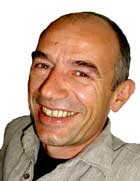 SONNTAG, 26.08.2001 15.00 Uhr:
SONNTAG, 26.08.2001 15.00 Uhr: Drug War against Pants
Prohibition is the wrong way not only in drug politics, but also in the fields of consumer- and health protection: prohibition of hemp makes people ill and pushes healthy products from the market. Mathias Broeckers, founder of HanfHaus, reports of the difficulties to put legal hemp products on the market - only a few of the more than 100 products developed since 1993 by HanfHaus have never been seized at least once in its history. The last and most spectacular case: the birdseed "Haenfling".
Mathias Broeckers is publisher and co-author of the German edition of Jack Herers "The Emperor Wears no Clothes" ("Die Wiederentdeckung der Nutzpflanze Hanf", Zweitausendeins-Verlag) and founder of HanfHaus GmbH.
| Mr. Franz Niewelt / Drugs Advice Center, Recklinghausen |
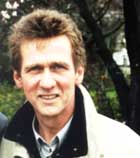 SUNDAY, 26.08.2001 4.00 a.m.:
SUNDAY, 26.08.2001 4.00 a.m.:The Importance of Cannabis in the Experience of a Drug Advisory Center - a Historical Review on 3 Decades
The importance of Cannabis in the everyday - experience of drug advisory center strongly changed through the last 3 decades: once demonized as gateway drug and direct way down to abyss, this assessment has to be seen in perspective nowadays. Physicians, scientists and drug advisors more and more recognize that a revaluation of Cannabis is appropriate.
The lecture deals with the following items:
*1950, married, two children (10 + 14 years)
Social Education Worker, Drug Advisor
Degree: Social Education Worker (Diploma) graduation 1978: title "Cannabis - a social-educational therapeutic? A pleading to decriminalize the drug scene"
Projects: